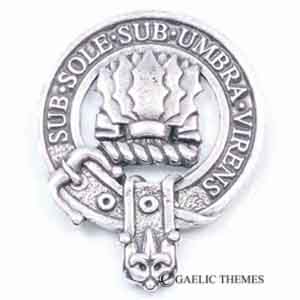Irvine
Select
- Design: Standard
- Clan Motto: Sub sole sub umbra virens (Flourishing both in sunshine and in shade)
- Notes:
Crest: A sheaf of holly consisting of nine leaves Vert slipped and banded Gules
Erewine and Erwinne are both old English personal names. The lands which first bore the Irvine name were around Dumfriesshire. Clan lore asserts that the family has roots in the ancient Celtic rulers of Scotland. Duncan Eryvine, whose son settled in Bonshaw, was the brother of Crinan who claimed descent from the High Kings of Ireland. Crinan married the daughter of Malcolm II and their son became King Duncan (the ruler whose murder Shakespeare based ‘Macbeth’ on).
William de Irwin served as armour bearer and secretary to Robert the Bruce. After twenty years of loyal service, he was granted the royal forest of Drum in Aberdeenshire, which became the hereditary seat of the family. Drum Castle, which began as a royal hunting lodge in the 13th century, was expanded and improved. The original ‘strong tower’ was unchanged and stands today as a perfect example of early castle construction. An especially beautiful castle, Drum was continually occupied by the Irvines until given over to the National Trust.
Twelve Irvine lairds have born the name of Alexander. The third laird was a mighty knight who followed the Earl of Mar in the French Wars and later fought at the battle of Harlaw in 1411. This was the last challenge made by the Lords of the Isles to the rule of the Scottish kings, fought just twenty miles from Drum Castle. Sir Alexander de Irwyne met Maclean of Duart in single combat. The epic duel ended in both men dying of their wounds.
The sixth laird was an accomplished peace-keeper rewarded by the king for suppressing “rebels, thieves, reivers, sorcerers and murderers.” In 1547, his eldest son fell in the battle of Pinkie fighting English invaders.
The tenth laird, sheriff of Aberdeen, supported Charles I in the Civil War. Drum Castle was besieged by Covenanter forces twice during the conflict. The first time it was only looted; the second it was sacked and much of the estate destroyed. After the war, the eleventh Alexander was offered a peerage for his service, but he refused it when the king did not offer reparation for the destroyed Drum estates.
The fourteenth laird, a Jacobite, fought at Sheriffmuir in 1715 and suffered for years after from a bad head wound. He died without a direct heir so the estate passed to an uncle and then a kinsman, John Irvine of Crimond. The Irvines also supported Prince Charles in the ‘45. After Culloden, the laird hid in a secret room in Drum Castle until he was able to flee to France, returning home only many years later.
The twenty-second laird was a Grenadier Guard during World War I. Sir Robert Irving of Bonshaw was captain of the Queen Mary and commodore of the Cunard Line.
